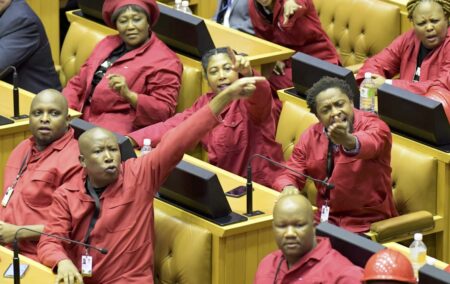While they may refer to themselves as “Economic Freedom Fighters,” (EFF) the reality is that what the EFF stands for and represents is the exact antithesis of economic freedom.
The fact of the matter is that one cannot advocate for the nationalisation of all the country’s land and claim to be a true advocate for economic freedom. Furthermore, genuine economic freedom fighters—as opposed to phoney ones—would comprehend that a national shutdown of all industries on 20 March would have disastrous effects on the economy and, consequently, the livelihoods of South Africans, especially the very poor and working-class people the EFF purports to represent.
The purpose of economic freedom is to enable a country’s citizens to be as economically independent as possible and to enhance their standard of living, especially in a sustainable way. Anyone who understands what it means to be economically independent knows that nationalising land does not advance this goal, but rather works against it. This is because when land is nationalised, it is acquired by the state rather than the citizens of that nation, which makes citizens more reliant on the government.
Real advocates for economic freedom recognise that granting title deeds to citizens — and with it the direct ownership of the land they occupy — makes it possible for citizens to become truly economically free. This is because their land will be a valuable good that they can choose to trade with, as opposed to state-owned land, which they may not use as they like and which may require them to pay rent to the government of the day, as the EFF has been arguing. The fact that a state renting out property to its residents would be run by politicians is what makes the situation even more dangerous. We all feel that we can’t trust politicians with our property.
When individuals with title deeds can trade their land without having to kowtow to or bribe some government official first, we can see that the people themselves can handle land far better than government can. We simply cannot afford as citizens to have to be submissive to government over the matter of land. It is a well-known fact that politicians, when given too much power and influence over our lives, can end up mistreating the people.
Yet the most crucial aspect to keep in mind about title deeds is that they enable privately owned land to have a market value attached to it. This is unlike in states where citizens lack title papers and must instead rent from the state. Owners of land with title deeds may take out loans against their properties, but in a nationalist state a land occupier cannot take a loan out against a state-controlled property, which is under the power of politicians.
The EFF’s opposition to free markets serves as the clearest indication that it is not a true advocate for economic freedom. True advocates for economic freedom recognise that only through a free market do citizens have the chance to improve themselves practically and on the basis of supply and demand.
In a free market one becomes wealthy by offering a good or service that people want and are willing to pay for, whereas in a controlled market, like the one the EFF envisions for South Africa, one’s freedom may depend on how a particular politician or political party feels once they are in power.
In a free market, for instance, a private medical doctor who practises general medicine may choose to charge R1500 for a single consultation, because that is what the doctor believes her services are worth. Of course, whoever is comfortable and can afford to pay the amount will do so by their own choice. In a controlled state of the kind that the EFF stands for, such a fee may be rejected by government and a cap might be placed on the amount the doctor may choose to charge. By effectively removing the doctor’s ability to choose the value of her own services, a regulated economy would empower politicians to determine the value of medical professionals’ services.
The fact that the free market regulates itself is important to note. In the same doctor’s case, if she charges R1500 and no one visits her practice, she could decide either to close down or reduce her rate in the hope that by so doing, she would attract custom. If a trader comes to townships to sell, for example, mirrors and pillows and the trader chooses what prices to charge, and if residents choose not to buy from the trader due to his prices, the trader may decide to stop selling at all or reduce the price to entice residents to buy. Government action is not required in this case. It is a process of self-regulation. Genuine advocates for economic freedom are aware of this fundamental economic truth.
The EFF’s demand for a nationwide shutdown on 20 March and its threats against those who choose not to participate, including businesses, are the most blatant sign that the organisation opposes economic freedom and is, in reality, a self-serving and ignorant political party. If businesses close in response to the EFF’s threats and thus incur losses, these may well result in job losses. How would all that advance the supposed economic freedom the EFF claims to be fighting for? Are not the poor and working class the ones whose means of survival would be most impacted by such losses?
Genuine advocates of economic freedom support free market principles, civil liberties governed by the rule of law, with a focus on individual autonomy, limited government, and political freedom, among other things. True freedom warriors would not compel anyone (especially through the threat of violence) to participate in their protests. Simply said, the EFF is not a true Economic Freedom Fighter.
[Photo: Jeffrey Abrahams/Gallo Images via Getty Images]

